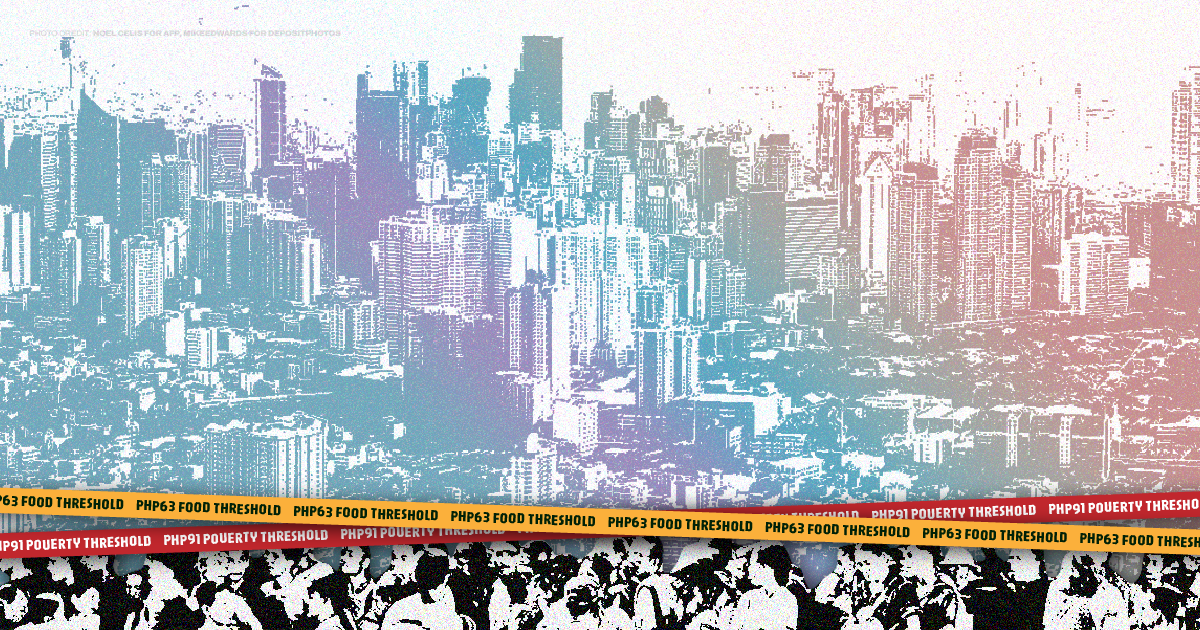The public reaction to the absurdity of the Php21 per meal poverty line highlights how official poverty thresholds are in urgent need of updating based on more decent standards.
The official poverty line sets a very low standard of living to not be considered poor. If not corrected, the real conditions of millions of poor Filipinos will remain understated and hinder genuine anti-poverty efforts.
The Philippine Statistics Authority (PSA) reported the poverty incidence or proportion of poor Filipinos in 2023 at 15.5% or just 17.5 million poor Filipinos. This appears to be a significant improvement from the 18.1% poverty incidence and 19.9 million poor Filipinos in 2021.
The seemingly improved poverty figures however are based on a low and unrealistic poverty threshold. The average daily per capita poverty threshold was only Php91 nationwide in 2023. This includes a daily per capita subsistence or food threshold of just Php63 (or three meals at Php21 each) and another Php28 for non-food needs. These thresholds or amounts to be considered poor or food poor are grossly underestimated and fail to meet minimum standards for food, shelter, transportation, utilities, health care, education, and other basic needs.
Economic planners need to review the official methodology in poverty estimation, which has two problems: 1) the unrealistic food poverty threshold; and 2) the failure to genuinely consider basic non-food needs and to cost these accordingly. The PSA estimates the poverty threshold by first computing a subsistence or food threshold and then just mechanically multiplying this by a factor of around 1.43 to get the poverty threshold.
The subsistence food basket needs improvement on two accounts. First, the food menu that technically meets bare nutritional requirements is sorely lacking in variety and more allowance has to be given for different options. Second, pricing this menu using the so-called ‘least cost’ approach results in an extremely cheap hypothetical food menu that is not likely to be available for most families in the real world.
The crude multiplier applied to calculate non-food items is also unacceptable. The methodology should instead actually list non-food needs and then cost these accordingly to come up with a budget for meeting families’ needs for housing, water, electricity, public transport, schooling, medical treatment and medicines, and other basic needs. This is essential to properly account for the rising prices of these non-food needs, especially with the privatization of social services.
Initial IBON estimates on Family Income and Expenditure (FIES) data in 2023 indicate that the poorest 50% or some 13.7 million families had monthly incomes of around Php23,000 or less. Around 70% or some 19.2 million families had monthly incomes of around Php29,000 or less.
These estimates give a better picture of the real state of deprivation of tens of millions of Filipinos than current official poverty statistics. A household receiving the group’s average family living wage (FLW) estimate* of Php1,215 for instance would be able to afford some Php28,500 in expenses monthly.
The official poverty threshold and resulting poverty magnitude are not just numbers but have a direct impact on the welfare of Filipinos. The official position on the extent and distribution of poverty is the most basic data for developing and implementing policies and programs for eradicating poverty. This information is a critical guide for determining the allocation of government budgets and resources, and for prioritizing interventions for social services and social protection.
The poverty threshold is however also specifically used for minimum wage-setting as well as for identifying beneficiaries of cash, health, education and other social assistance programs. Keeping the poverty threshold low will only be used to justify low minimum wages. Likewise, downplaying the extent of poverty will only be used to justify inattention to publicly-provided education, health, housing and other assistance.
A realistic poverty benchmark is essential to monitor the effectiveness of government programs and policies to develop the country. On the other hand, unrealistic poverty and subsistence thresholds are powerful devices to hide their ineffectiveness.
The choice of official poverty lines is fundamentally a political one. By setting a realistic or high standard, the government shows a high level of ambition in eradicating poverty. Conversely, setting a low standard means low targets for dealing with the poverty situation. The Marcos administration has chosen the latter, which results in tens of millions of Filipinos not meeting minimum standards of well-being and hidden behind unrealistic official poverty statistics.
The current controversy should also draw attention to how “poverty” is actually a broad concept that covers not just family incomes but deprivation across so many other dimensions. There are certainly aspects closely linked to capacity to buy like education, health, housing and other material needs. There are however also other relevant concerns such as social exclusion, personal security and safety, environmental conditions, political empowerment, and general well-being that are not mainly or wholly purchased on the market.
A genuine concern for eradicating poverty in the Philippines needs to take a broader view of human development. Family or household incomes are of course important and the government can at least start with getting this more correct, instead of concealing the true extent of the problem at hand.
*The FLW assumes a five-day workweek including the 13th-month pay.



